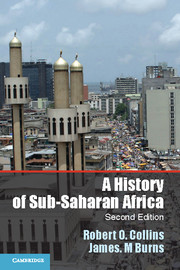Book contents
- Frontmatter
- Dedication
- Contents
- Acknowledgments
- Introduction
- Part I Foundations
- 1 The historical geography of Africa
- 2 Kingdoms on the Nile
- 3 The peoples of sub-Saharan Africa: society, culture, and language
- 4 Crops, cows, and iron
- 5 Northeast Africa in the age of Aksum
- 6 Empires of the plains
- 7 East Africa and the Indian Ocean world
- 8 The Lake Plateau of East Africa
- 9 Societies and states of the West African forest
- 10 Kingdoms and trade in Central Africa
- 11 The peoples and states of southern Africa
- Part II Africa in World History
- Part III Imperial Africa
- Part IV Independent Africa
- Index
- References
5 - Northeast Africa in the age of Aksum
Published online by Cambridge University Press: 05 June 2014
- Frontmatter
- Dedication
- Contents
- Acknowledgments
- Introduction
- Part I Foundations
- 1 The historical geography of Africa
- 2 Kingdoms on the Nile
- 3 The peoples of sub-Saharan Africa: society, culture, and language
- 4 Crops, cows, and iron
- 5 Northeast Africa in the age of Aksum
- 6 Empires of the plains
- 7 East Africa and the Indian Ocean world
- 8 The Lake Plateau of East Africa
- 9 Societies and states of the West African forest
- 10 Kingdoms and trade in Central Africa
- 11 The peoples and states of southern Africa
- Part II Africa in World History
- Part III Imperial Africa
- Part IV Independent Africa
- Index
- References
Summary
Towering above the vast Sudanic plain to the west and the Horn of Africa to the east are the massive highlands of Ethiopia, which have captured the imagination of foreigners for more than two thousand years. The ancient kingdom of Ethiopia was celebrated by the Hebrews in the Bible. In Islamic traditions and history, Ethiopia has been regarded as special and unique, for the Prophet Muhammad requested asylum for his followers from the Christian negus (king) al-Asham of al-Habasha (the Abyssinians) who enthusiastically agreed to give them sanctuary in the first hijra (Arabic, “migration”: flight of the Prophet's adherents from Mecca) to celebrate their beliefs free from the persecution they had experienced in Mecca. Medieval Europeans and Crusaders knew of a Christian kingdom in the Ethiopian highlands, which they hoped to enlist against their Muslim enemies, but its isolation prevented the consummation of any grand alliance. In the sixteenth century, Portuguese mercenaries arrived to prevent the kingdom from being overwhelmed by the Muslims from the plains of Somalia. Thereafter, European interest in Ethiopia waned until the resurgence of the empire in the nineteenth century, which precipitated the invasion by a British expeditionary force to rescue the British ambassador incarcerated by the emperor Tewodros (Theodore) II (1818–68). The British stormed the capital at Magdala on April 13, 1868, and secured the release of the ambassador; Tewodros took his own life and the British withdrew. The cult of Ethiopia, however, continued well into the twentieth century, as the descendants of freed slaves in Jamaica revered the historic kingdom as the birthplace of their divine leader, the emperor Haile Selassie, and it was no coincidence that Addis Ababa was selected as the site of the new Organization of African Unity in May 1963. As the only African nation to successfully resist European invasion, Ethiopia holds a special place in independent Africa and throughout the African diaspora.
- Type
- Chapter
- Information
- A History of Sub-Saharan Africa , pp. 64 - 77Publisher: Cambridge University PressPrint publication year: 2013



